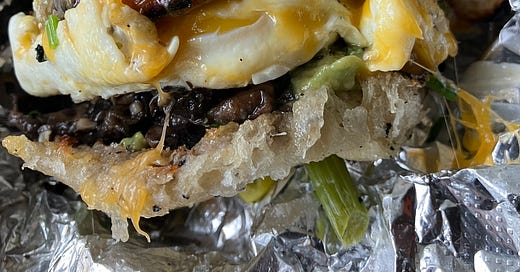Hullo to readers old and new!
This is in the tradition of “I couldn’t write a short letter, so I wrote you a long one,” but it’s not even that long. I don’t know if I can be precise about this particular idea, so I’m sending something rough-edged instead.
Today’s also the last day for the Cambridge, MA Companion discount – access to the best, and only, encyclopedia of Singaporean food on the internet at 50% off.
But beyond the Cambridge, MA Companion, essays like this have always been the heart of this newsletter, and if you find them worthwhile, I hope you’ll consider a paid subscription. A month’s subscription costs less than a big city coffee, and your subscriptions enable me to continue writing for you.
When KC visited, I had to explain to him what pop-ups are, whereupon he said, “So you’re basically an itinerant hawker, wandering from place to place with your food.” My reply was a huge, dumbstruck bite of my sandwich, and the sound of chewing. I think he had in mind someone like this.
He’s old enough that he actually did buy food from folks like that, who’d tote their entire operations around with them, stoves, crockery, seating and all. The comparison is utterly ridiculous, but maybe it’s not. I actually am wandering from place to place, cooking for people, and maybe the only way this could be better is if I were getting paid only in cash. I want to boil the business of feeding people down to its essentials, to cook and get paid for cooking in a totally disintermediated, direct, and naked way, and maybe that hasn’t really been possible since that guy was wandering the streets with his handcart.
I mean look at that setup. There’s barely even a signboard. Just someone cooking in public. If you’re hungry and you want what they’re making, you hand them some cash. How close can we get to that today?
I think the question fascinates me because cooking is care work, and the value of care remains obvious, because care is about providing the necessities of life. If the work is cooking, maybe everything but the heat and the eating is in some fundamental way unnecessary – everything from seating to flatware to the gram is just rigmarole. Maybe satiation’s still essential, and maybe gratitude.
In Pittsburgh this spring, I walked from Squirrel Hill to Lawrenceville, a path which undulated up and down more than it did side to side. Most of the way to Lawrenceville I saw a tent on the sidewalk, a sandwich board, and a bunch of people standing in a line. They stood in front of the brokedown facade of a former luncheonette that was clearly a former something else. The whole building was a kitchen. Daylight made it a cavern, cooks moving vaguely amongst piles of boxes and stainless steel hulks. A person handed egg sandwiches and donuts out the front door. Mine was exemplary, soft and dripping in all the right ways, a sandwich to wipe off your fingers and chin.
Someone was telling me that their friends talk in great detail about restaurants they’ve never been to. You can do that now if you just follow a place on the internet, because that much detail bleeds into the ether now. This felt like the opposite – a restaurant you follow on the internet because you’ve eaten there, a place where the relationship is irreducibly based on a sandwich handed across a threshold. They’re in the middle of nowhere, and there’s no reason to go except that you want not just a sandwich, but their sandwich. There’s a kernel of something there, something akin to feeding people without a signboard. Something that says it’s still the food that’s necessary.
I’m not saying we don’t need to feed souls, but there’s a difference between taking delight in food and taking delight in status. And maybe something that’s happened, now that everyone’s a broadcaster, is that status is a more universal currency, is that delight in food and delight in status have become a little too closely bound, that food is much less a private or even communal pleasure, and more a public one. You can’t broadcast how a sandwich tastes. And if the actual eating is becoming less and less important, then what’s the cooking worth?
And I have business cards and a website and an instagram account I barely use, and I have all of this because I have to, because there’s no way to go on the street and start selling food, but also because I need to explain how I’m offering status as well as food, because if I’m just offering food, I’m competing with Denny’s, and I can’t compete with Denny’s.
Maybe just selling food is an activity for the fringes, a thing you can do if your rent is low and no one around you is making much money. In colonies still thrashing through development. On a run down stretch of a rutted road that yawns between the lymph nodes of a midsize city. New York’s most exciting food has always been found on the scarred borders of the cyborg city, where the parts deadened by metal and cash meet the parts that still feel mutable and alive. Places like the Queen’s Hideaway, or Porcelain, or Mu Ramen, where the dishes screamed onto your table like flaming comets from another dimension, smoking with imagination and vibrating with promise and life.
Cooking, eating. Cash, thanks. What makes us need more than that?
Another essential restaurant, Paris, May 2023.
That sandwich. Eaten standing in an entrance alcove. Pittsburgh, April 2024.



